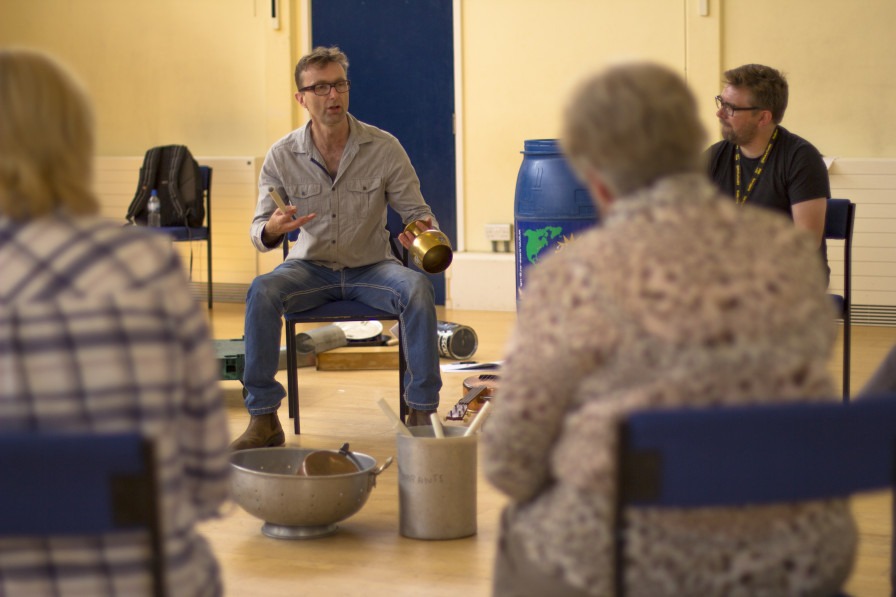Feedback Loops

Following the last of three family music sessions at Stevenage Music Centre, Mark Howe discusses different types of feedback.
This week was the third and final session session of a family junk percussion course I’m running at Stevenage Music Centre for MusicNet East. There were three main aims, to consolidate the experience and learning so far, to introduce and play ukuleles and for the participants to perform to themselves in smaller groups.
The final session is an appropriate time for everyone to summarise, celebrate and assimilate the experience. In the midst of a session we are, one way or another, receiving constant feedback on what is happening, a sort of live reflection process that in turn has an impact on the present moment, the immediate next and beyond. This blog focuses on three key incidents or feedback loops within this final session.
Loop 1 - I'd been using an old double bass in other sessions elsewhere all week - I'd rescued it from the sea on a particularly fine day a couple of years ago, or so the story goes! And, the story on this occasion was quite rich, energetic and detailed. When it ends there is that funny clicking moment as people come out of the dreamy world and back into the visceral room. Is that true? Should I say?
Looking for signs on this day of engagement and inclusion, a mother approaches me at the end of the session. ‘Was that story true?’ she asks. The power of story to place information, create mood, to hang music around is universal and very useful.
Loop 2 - He's 7, a big 7, highly engaged and has responded so enthusiastically to the conducting opportunities in the sessions that this week he brought in his own baton (a slender conical arrangement, white paper with a blue stripe spiralling down) along with a very clearly expressed notion to use it. Which we duly did - his enthusiasm for participation is at the extreme end and he is a real delight to see and work with. Highlights: at one point in the proceedings he asks if he can stand with me as we are preparing to do a large group piece, can he follow me around, can he be in the space with me. He wants to do what I am doing, he wants and is ready for that control and responsibility. We play with this, whispering instructions to one another about how we are going to conduct people, what they might play, what the rules could be! At one point he is literally speaking into my ear on my right side ‘can we do this for ever, can we do this all the time, can we keep doing this?’ I don't look 'round, but it is like a voice in my head and I logged it as a new experience. It makes me smile. It occurs to me at some point, that he is a young, a very young, music leader, working with a group completely appropriately, in no way bombastic or ‘look at me’, just totally enthused, a shadow set loose and lost in the excitement and intention of it all. It's the sort of interaction that requires acknowledgement and some form of signposting at the end of the session with the attendant parent, and, in the midst of that mayhem I partially do this. In any event, he makes to me a gift of his handmade conductor’s baton - now that's inspired!
Loop 3 - The session is overseen by the head of the music centre. We've had many dealings throughout the proceedings and at the end she comments on the sessions and my approach with positive warmth and specificity. In the midst of this I remember how important it is to receive and acknowledge any form of feedback but I still manage to squirm somewhat!
I don't have a trumpet, unless you count an old bicycle horn that I use occasionally to shake things up a little, but even if I did I wouldn't be blowing it now. Behind every one of these feedback loops, or any other for that matter, good, bad or indifferent, lies the opportunity to improve one's practice, to more fully enjoy the experience of making music with all manner of people and, most of all, to see deeper and deeper into the supreme power of music to change people.
So, by way of conclusion here are the three specific learning points related to the feedback above:
1. Never reveal whether a ‘story’ is true or not.
2. Always find time or a way to value and support enthusiasm and genuine interest.
3. Fully embrace with gratitude and a calm and measured eye any feedback received.
